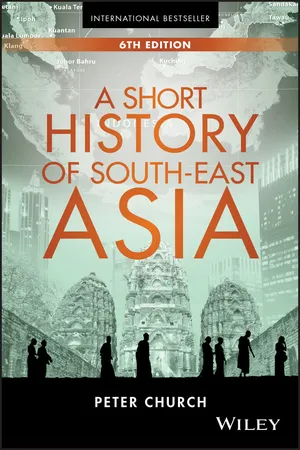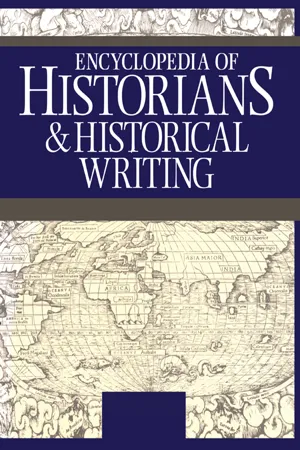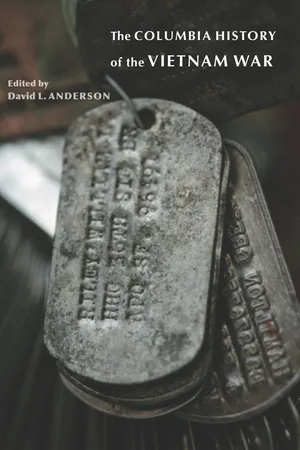History
Imperial Vietnam
Imperial Vietnam refers to the period when Vietnam was ruled by a series of dynastic emperors, beginning with the Đinh dynasty in 968 and ending with the Nguyễn dynasty in 1945. This era saw the development of a distinct Vietnamese culture, the expansion of the country's territory, and the adoption of Confucianism as a guiding ideology.
Written by Perlego with AI-assistance
Related key terms
3 Key excerpts on "Imperial Vietnam"
- eBook - ePub
- Peter Church(Author)
- 2017(Publication Date)
- Wiley(Publisher)
11 VietnamThe Vietnamese were ruled by the Chinese for over a thousand years, from the 2nd century BC until the 10th century AD . After winning their independence, the Vietnamese continued looking to China as their cultural model, their prime source of concepts of government, social organisation, and the arts. Culturally, Vietnam thus belonged to the Confucian world of East Asia, which distinguished it sharply from neighbouring states with Theravada Buddhist or Islamic cultures. The difference in cultural outlook between Vietnam and her South‐East Asian neighbours has long contributed to conflict in the region.But the Vietnamese regard for China also made for conflict within Vietnam itself. It proved difficult to reconcile with another Vietnamese impulse—to protect their distinctive character as a people and to uphold uniquely Vietnamese cultural traditions. Whether to adopt or to resist Chinese ideas became a perennial source of social and cultural stress within Vietnam's ruling class, and also between ruling class and people.The Vietnamese state was an expanding one, which only intensified such cultural stresses though it took 700 years. The expansion, known as the “march to the south,” eased the country's population pressures and made Vietnam a major power in South‐East Asia. But it also bred deep regional differences and rivalries within Vietnamese society. Vietnam in the 19th century was in poor shape to face the challenges posed by the West's political, economic, and cultural expansion.The Western impact, in the shape of French colonial rule and subsequent American intervention, aggravated the historic tensions and also cut bitter new divisions in Vietnamese society. Communism in Vietnam, as in China, won wide popular support, with its promise of national independence and a reintegrated and just society. It delivered on the first promise; it failed on the second. As in China, communism in Vietnam as an overarching state ideology now drifts uncertainly, though most observers are optimistic about the future of Vietnam's 94 million people living in a state under Communist Party control but with a free‐enterprise economy. - Kelly Boyd(Author)
- 2019(Publication Date)
- Routledge(Publisher)
Historical writing becomes much richer for the modern period. There are several good surveys of this era, including those by Woodside, Buttinger, Neil Jamieson, and Ngo Vinh Long as well as the essays collected by David Elliott and Walter Vella. The gradual colonization by French imperialism, and the (often negative) impacts this had on Vietnam's political evolution, social structure, and economic patterns, generated a number of studies. The French imperial enterprise has been analyzed by, among others, John Cady, Milton Osborne, and Pierre Brocheux and Daniel Hémery. But even after conquest it took the French an additional fifteen years of bloody repression to "pacify" the country against a heroic resistance; this opposition has been well studied by Truong Buu Lam, Helen Lamb, and David Marr.The social and economic aspects of French colonialism, including the effects on village life, have been the subject of numerous studies, including those by Ngo Vinh Long, Hy V. Luong, and Pham Cao Duong (all writing on the transformation of the peasantry), Brocheux (a study of the Mekong delta), Nguyen Van Phong (early colonial social change), Donald Lancaster, and Martin Murray (on capitalist development). Both Marr and Woodside have brilliantly deciphered the complex intellectual and cultural developments of the period, while Osborne has outlined political change. The nationalist surge that commenced after the turn of the century and accelerated before World War II, most significantly in the form of the communist movement, has generated a considerable literature. William Duiker's various books constitute an essential baseline for understanding, augmented by Huynh Kim Khanh's incisive study of Vietnamese communism. The best biography of communist leader Ho Chi Minh is by Jean Lacouture. Mention should also be made of the works by John T. McAlister and Paul Mus, Ken Post (an exhaustive 5-volume study of the Vietnamese revolution), Hémery, Hodgkin, and Hue-Tam Ho Tai (who writes on noncommunist radical traditions).- eBook - ePub
- David Anderson(Author)
- 2010(Publication Date)
- Columbia University Press(Publisher)
Gia Long, because of Pigneau’s help and because he was aware of Western power, tolerated the presence of French missionaries in his country, but he and especially his successors were hostile to Christianity. Increasing persecution of missionaries and the West’s growing appetite for markets and resources in the nineteenth century caused France to send a naval force to Tourane (Danang) in 1858. From then until 1897, in a piecemeal fashion, France used military force to create what it called the Indochina Union, headed by a French governor-general in Hanoi. French Indochina consisted of five parts. In 1862, Emperor Tu Duc ceded Cochinchina, the area around Saigon, to France as a colony. Annam (central Vietnam around Hue) and Tonkin (northern Vietnam around Hanoi) became French protectorates in 1883. Paris also established protectorates in Cambodia in 1862 and Laos in 1893.French colonial rule in Vietnam was incredibly illiberal, narrow-minded, and destructive. The partitioning of Vietnam into three pays (countries), as the French called Tonkin, Annam, and Cochinchina, reversed centuries of Vietnamese efforts to create national unity. The Nguyen emperors had themselves administered their elongated country through three ky (regions) that were roughly analogous to the pays, but where the emperors sought to use this structure to promote unity, the French desired division. The colonial authorities even outlawed the use of the name “Vietnam.” This colonial-enforced regionalism magnified cultural differences that had already existed from the March to the South, which brought Chams, Khmers, and others within Vietnam’s borders. Vietnam’s historical difficulty in achieving internal unity in the face of external threats was once again manifest.The French governors sought to protect their authority by depriving the country of its native leadership. Giving their program the high-sounding name mission civilisatrice
Learn about this page
Index pages curate the most relevant extracts from our library of academic textbooks. They’ve been created using an in-house natural language model (NLM), each adding context and meaning to key research topics.


